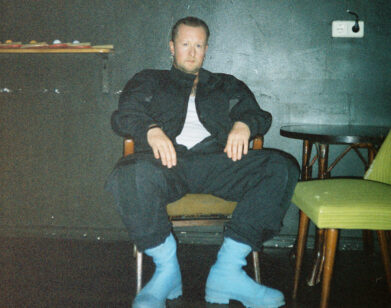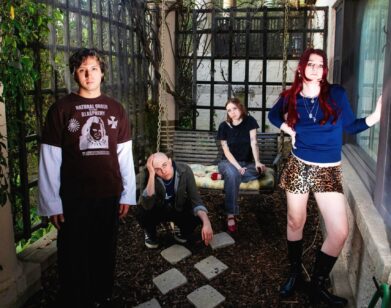The Maccabees Come Home

THE MACCABEES. PHOTO COURTESY OF JORDAN HUGHES.
The success of 2012’s Given to the Wild brought London-based band The Maccabees around the world and back. They were nominated for multiple awards (such as the 2012 Mercury Prize), graced the covers of rock magazines like Q and NME, and played for sold out audiences as far as Japan and Australia while simultaneously working their way up festival bills throughout Europe. They’ve toured with everyone from Florence and the Machine to Mumford and Sons, The Drums, and Bombay Bicycle Club, and this Friday, July 31, marks the band’s next step: the release of their fourth studio album Marks to Prove It via Communion Records in the U.S.
During the recording process, the pressure to continuously evolve led the band to scrap an entire year’s worth of material. Recording Marks to Prove It pushed the British quintet further than they’d ever gone before. But the results were worth it, as the album includes more instrumentation than any of their prior releases, oscillating between powerful upbeat rock tracks and delicate piano-led ballads.
“The first year of recording, we felt a lot of tour confidence, rather than a studio confidence,” soft-spoken lead vocalist Orlando Weeks says. “We took the tour confidence and started writing and finishing things that we had been working on while on the road. [When we] listened back, all of a sudden the tools we were using felt like cheap tricks,” Weeks continues. “It felt like a year of repeating ourselves—what’s the fucking point of that?”
In sum, Marks to Prove It is a love letter to the band’s beloved home in Elephant and Castle, a neighborhood in South East London. Last month, ahead of their Le Poisson Rouge show in New York and armed with a slice of Artichoke pizza and beer, Weeks spoke about the album and took us on a virtual tour of Elephant and Castle.
STEVEN EDELSTONE: Right now you’re on tour with Mumford and Sons. From a musical perspective, it doesn’t make all that much sense. How did that tour happen?
ORLANDO WEEKS: We’ve known the Mumford boys for years and they supported us on their first ever U.K. tour. I think they like our band and we like their band. The thing I’ve been impressed with [is], I knew they were great musicians and they care massively about the people who buy tickets, but they also know where they want to go. Ambition is a dirty word, but I don’t think that it should be. I think that as long as your ambition has all of the right motivations, then it’s fine with me. It’s really good to be witnessing that first hand.
EDELSTONE: With the exception of Oasis or Kanye West, you don’t have too many artists in recent memory that make it a point to be the biggest band in the world. Do you have that mindset?
WEEKS: No, but we’ve been lucky. Each time we put out an album, we play to a bigger and bigger crowd. It’s too difficult to try and preempt what a gig is going to be like. You could play to loads and loads of people and it could be great or awful, or you could play to 20 people and it could be great or awful. Our ambition is not to be the biggest band in the world; our mission is to play to stadiums. I don’t think that we would have made this album that feels so settled into our neighborhood, Elephant and Castle, if we purely wanted to be the biggest band in the world.
EDELSTONE: You are wildly more popular in the U.K. than you are here. Is it nice to play smaller venues like tonight?
WEEKS: We did a U.K. tour recently for about two weeks and we were playing to about 1,500-2,000 people. It was bigger than tonight, but they weren’t enormous places. That was a warm up tour, however. We really feed off of the atmosphere in a room, so who knows—maybe it’ll be a really nice atmosphere in the room and we’ll have a great gig, or it’ll be awkward and we’ll be awkward. It’s like going to a house party: I always feel that if I haven’t introduced myself or our band in the first one or two songs, then, like at a house party, you end up feeling awkward, standing in the corner and either going home early or drinking too much.
EDELSTONE: Four albums in, do you have the same sense of urgency or the feeling that you need to “break America” that you may have had when you were younger?
WEEKS: I’ve always felt lucky to come over to America, and it still feels like an exotic location. It’s been slightly less exotic when doing these tours with Florence or Mumford because they’re playing such big places that what you’re seeing is car parks, which isn’t terribly romantic. We’ve put an awful lot of effort into the record, and the main celebration of that effort is going and playing it to people.
EDELSTONE: At times, this is a much quieter record than your previous releases. How does the new album translate live?
WEEKS: It’s odd actually—without meaning to, it gives context to all three of the previous records because there’s a little bit of each in it. In terms of theme, I’ve spent a long time thinking about the record and the lyrical content being relevant to Elephant and Castle. More often than not, the starting points of the songs come from things I’ve overheard around our neighborhood. It’s this weird little bit of London in Zone 1 that hasn’t been gentrified yet and is still holding onto its identity. It’s slowly losing that now, but it’s still got this eccentricity to it. The record then becomes about that area, in a way, shining a new light on all of the things we think are fantastic about it.
Because of that, it suddenly makes sense to play songs that we wrote 10 years ago, like “Latchmere.” It’s a song that I’ve refused to play for five or six years because I didn’t want to be playing something just because people in the front row were drunk and shouting for me to play it. Now it feels like its relevant again and there’s context to it. A song like “Marks to Prove It” makes a song like “Precious Time,” which is eight years old, have a different relevance.
EDELSTONE: When you’re constructing your set lists, do those older songs have much of a relevance to you personally? Do you still identify with those lyrics that you wrote almost a decade ago?
WEEKS: Sometimes, but not always. When I wrote them, I meant them wholeheartedly, but my turn of phrase or my opinion of things is bound to have changed in eight years, so it’d be very weird to get behind something wholeheartedly that I had written as a 21 year old.
EDELSTONE: Colour It In, your debut album, pretty much soundtracked my high school experience and was one of my most played albums. When I hear the record now, it brings a lot of nostalgia. Do you look at that album through a similar nostalgic lens? When you play those songs live, do you ever get transported back to those first few gigs?
WEEKS: No, I’m too aware of its shortcomings; all I hear are its problems. Maybe when I’m 40 or 50, I’ll look back and hear it differently, but when I hear it now, all I hear are my insecurities and the language I used. Naturally, I am nostalgic, but now, I find it almost impossible to listen to it.
EDELSTONE: One thing that stuck out to me in the new album is the feeling of looking back. On “Kamakura,” you sing, “Your best friends forgive you / Your best friends forget that you get old.” You said a lot of this album came from listening to people around your neighborhood, but how personal is it for you lyrically?
WEEKS: I’ve always written in the first person and I wanted to see if I could write in the third person and still sustain an emotional connection.
EDELSTONE: Is there a way to disassociate yourself from your own lyrics to preserve your sanity on tour?
WEEKS: I’ve found it very difficult, especially if I know someone in the crowd. On the whole, however, it depends how introverted you’re feeling that day or night. I think you’ve got to be brave about it; when you’re in those motions, you have to think about the fact that your lyrics go on to mean something totally different to other people than what they mean to you. I think it’s very dangerous when people explain songs. With this record, when it’s not about me, I feel like I can explain the story behind the songs a little bit more. Sometimes I would like to explain everything, but I don’t want people to know the full story.
EDELSTONE: What goes through your mind when you’re onstage and you know everyone is looking at you, but you don’t know who’s out there?
WEEKS: Last night, we played to this enormous crowd and I was thinking, “How do I give these songs a platform and how much of our personality can we let out there?” I felt like I just blew it, like I was trying to encourage audience participation even though we were the support. About halfway through it, I lost my nerve and became very introverted. I want people to have a nice time and I want to feel connected and give the songs the best chance that they can have, but sometimes I feel like I blow it.
EDELSTONE: How often do you get those feelings of introversion onstage?
WEEKS: Quite a lot, really. I’m very lucky that [guitarist] Felix [White] is so good at that rabblerousing, since I’m not and I have a slightly softer approach. Last night, for example, Marcus Mumford came on stage with us and did the last song with us—”Pelican.” First thing he did was say, “If you’re not stood up already, then stand the fuck up!” I couldn’t even begin to say that, but everyone stood up. Should I go up there and say, “Stand the fuck up?” Actually, that would be my bullet even quicker because I’d feel so self-aware; I don’t normally say things like that. I’m not a natural performer, but we’ve come this far and I need to make the best of it.
EDELSTONE: Do you have a favorite song on the record?
WEEKS: I think “Silence” is a very beautiful song and I can listen to that without listening to me, which is a treat. I’m proud of us for the way that we dealt with that song, for stripping it back as far as we did. I still like listening to the last two songs—”Pioneering Systems” and “Dawn Chorus”—because we were brave in putting the closing songs on the record like that.
MARKS TO PROVE IT WILL BE RELEASED JULY 31. FOR MORE ON THE MACCABEES, VISIT THE BAND’S WEBSITE.






